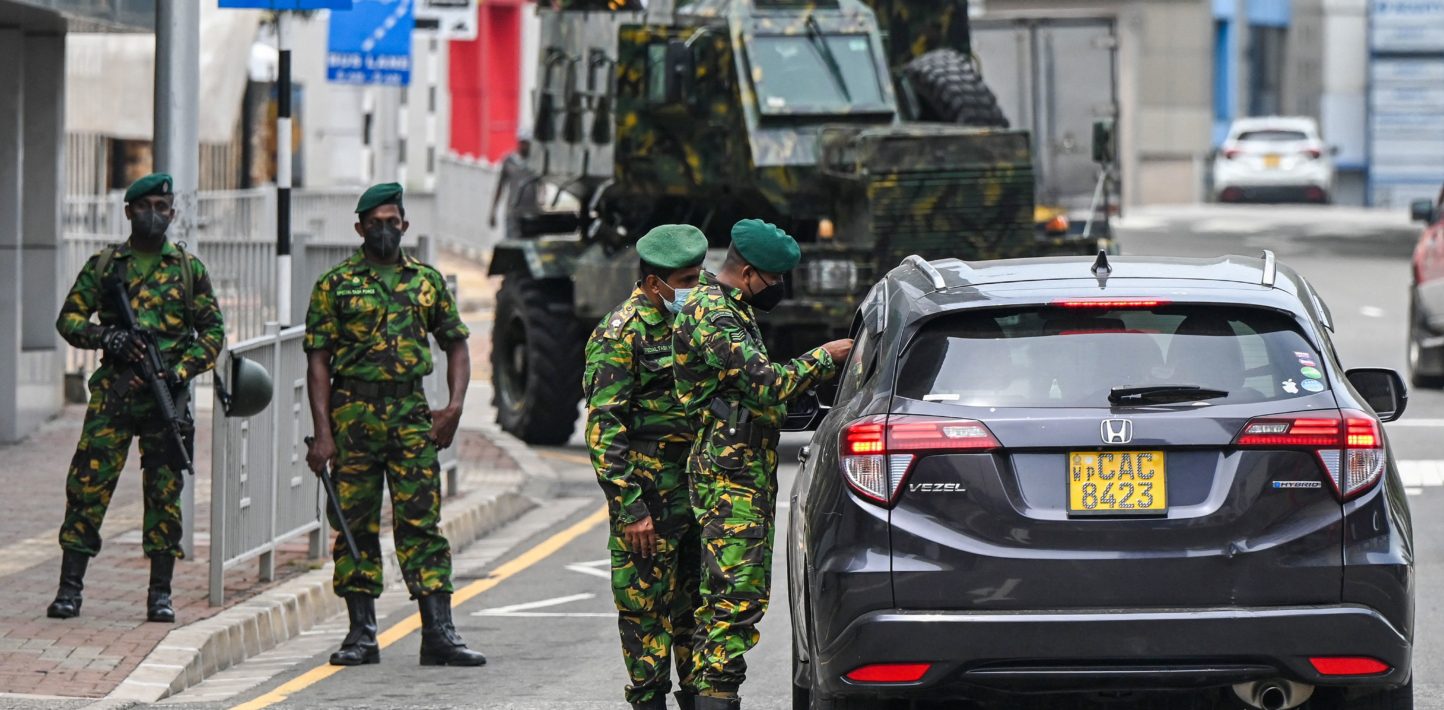PRESS RELEASE
Authorities in Sri Lanka must immediately rescind the emergency regulations and shooting orders that provide excessive powers to the police and military, and take immediate steps to respect, protect and fulfil the human rights of peaceful protestors, Amnesty International said today.
The authorities must also refrain from using the state of emergency as a pretext to curb the rights to peaceful assembly and freedom of expression, including at the protest sites such as “Gotagogama” in the country.
Following the President’s proclamation of a State of Emergency on 6 May along with a country-wide curfew from 9-12 May, backdated emergency regulations were published overnight on 9 May. They give sweeping powers to the police and the armed forces to search and make arrests of “suspects” without due process safeguards. On 9 May, protesters peacefully demonstrating in front of the Presidential Secretariat since over a month were violently attacked by pro-government supporters after being allegedly incited to violence by top party leaders at Temple Trees, the Prime Minister’s official residence in Colombo. The police stood largely as bystanders to the violence, doing little to effectively protect the peaceful protesters and their protest site, despite having used tear gas and water cannon to disperse the protestors just days before on 6 May.
“Authorities in Sri Lanka should carry out a prompt, thorough, impartial, independent, effective and transparent investigation into the reports of violent attacks on peaceful protesters. Authorities should bring to justice those suspected to be responsible and ensure access to justice and effective remedies for victims,” said Yamini Mishra, South Asia Regional Director at Amnesty International.
“The attacks look like a deliberate decision by the Police to allow pro-government groups to physically assault peaceful protesters, destroy structures and wreak havoc at the ‘Gotagogama’ protest site. The authorities have an obligation to provide an enabling environment for the protesters to peacefully exercise their human rights, and to end the violent attacks on protesters,” added Yamini Mishra.
Elements of anti-government groups retaliated to the attack on 9 May by beating up pro-government supporters and destroying buses believed to have transported them. This escalated into targeting of parliamentarians with damage to their vehicles and arson against their homes, businesses, and party offices. According to authorities, nine people have died and over 220 people have been injured in the violence that erupted. Additionally, 41 vehicles had been set on fire, 61 vehicles were damaged, and 136 incidents of property damage were recorded.
Justice and accountability from the Sri Lankan authorities is the need of the hour.
Yamini Mishra, South Asia Regional Director at Amnesty International
“Justice and accountability from the Sri Lankan authorities is the need of the hour. An effective and transparent inquiry is necessary to bring those responsible for the violence to justice. The country is headed towards a deepening crisis while accountability and solutions for the economic crisis – key calls by the protesters – go completely unaddressed. Right now, Sri Lanka is a tinderbox, and any move to impermissibly restrict human rights through sweeping emergency powers granted to law enforcement agencies, including the armed forces, – will lead to further repression,” said Yamini Mishra.
The Emergency Regulations lack due process safeguards, such as the right to be informed of the reason for arrest, and the issuance of an arrest receipt at the time of arrest informing family where they would be detained. Access to legal counsel is subject to conditions. The offences are broad and can be used to bar trade union strike actions, give powers to the President to shut down public processions, restrict access to public spaces, restrict the right to freedom of expression including the right to information, freedom of movement and peaceful assembly.
Further, the Regulations provide powers to use armed force against anyone who does not comply with orders. The Regulations come with hefty penalties including life imprisonment for ordinary penal offences. There is also no access to bail for offences under the Regulations, except under “exceptional circumstances.” Persons authorised by the commanders of the armed forces are empowered by the Regulations to remove suspects from detention for a period of seven days at a time. Sri Lankan authorities are accused of multiple instances of custodial torture in the past, making these provisions dangerous and raising the possibility of misuse of these powers.
On 10 May, the Defence Ministry issued a notice saying the Armed forces have been ordered to open fire at anyone looting public property or causing harm to others- a move that has been called “illegal” by some parliamentarians. The cabinet remains dissolved following the PM’s resignation on 9 May.
“The shooting orders provide a license to kill. Violent mobs should be contained, however lethal force must not be the first resort. Any restrictions on human rights during times of emergency must be necessary and proportionate to the exigencies of the situation and must not be used as a tool against freedom of expression, peaceful assembly, right to personal security, liberty and freedom from arbitrary detention. Further, any derogations from human rights guarantees under the International Covenant on Civil and Political Rights, to which Sri Lanka is a state party, should be formally communicated with a clear explanation of the reasons for them to other State parties,” said Yamini Mishra.
Sri Lanka has a history of human rights violations implicating the Military, including custodial torture under consecutive emergency situations in the past. This pattern of violations of human rights must end.


